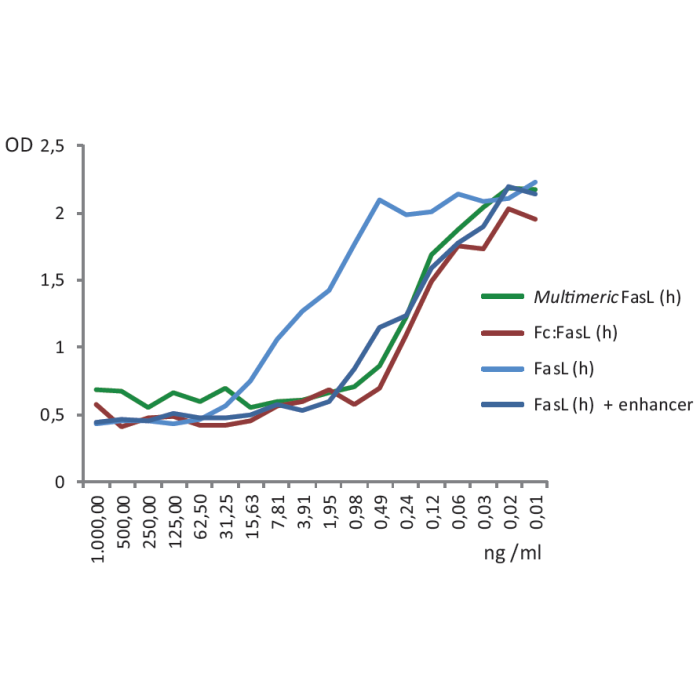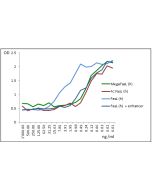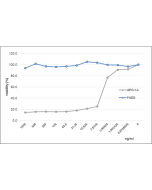Cookie Policy: This site uses cookies to improve your experience. You can find out more about our use of cookies in our Privacy Policy. By continuing to browse this site you agree to our use of cookies.
AdipoGen Life Sciences
FasL (human) (multimeric) (rec.)

Method: Jurkat cells were treated O/N with the indicated concentrations of FasL (human) (multimeric) (rec.) (Prod. No. AG-40B-0130), Fc:FasL, Soluble (human) (rec.) (Prod. No. AG-40B-0132), FasL, Soluble (human) (rec.) (Prod. No. AG-40B-0001) or FasL, Soluble (human) (rec.) + TNF ligands enhancer (Prod. No. AG-44B-0001) (2 fold-dilutions, first concentration of 1000ng/ml). Cell death was quantified using PMS/MTS. The oligomeric FasL recombinant proteins (FasL (human) (multimeric) (rec.), Fc:FasL, Soluble (human) and FasL, Soluble (human) + TNF ligands enhancer) kill Jurkat cells at IC50 <0.2ng/ml.
| Product Details | |
|---|---|
| Synonyms | MultimericFasL™; MegaFasL; ACRP30headless:APO-1L; ACRP30headless:CD95L; ACRP30headless:CD178; ACRP30headless:TNFSF6; ACRP30headless:Fas Ligand |
| Product Type | Protein |
| Properties | |
| Source/Host | HEK 293 cells |
| Sequence |
Human FasL (aa 139-281) is fused at the N-terminus to mouse ACRP30headless (aa 18-111) and a FLAG®-tag. |
| Crossreactivity |
Human Mouse |
| Specificity |
Binds to human and mouse Fas. |
| Biological Activity |
Induces apoptosis of human Jurkat T cells at a concentration of <0.2ng/ml. |
| MW | ~40kDa (SDS-PAGE) |
| Purity | ≥95% (SDS-PAGE) |
| Endotoxin Content | <0.02EU/μg purified protein (LAL test). |
| Concentration | 0.1mg/ml after reconstitution. |
| Reconstitution | Reconstitute with 100μl sterile water. |
| Formulation | Lyophilized. Contains PBS. |
| Other Product Data |
UniProt link P48023: FasL (human) |
| Shipping and Handling | |
| Shipping | BLUE ICE |
| Short Term Storage | +4°C |
| Long Term Storage | -20°C |
| Handling Advice |
After reconstitution, prepare aliquots and store at -20°C. Avoid freeze/thaw cycles. Centrifuge lyophilized vial before opening and reconstitution. PBS containing at least 0.1% BSA should be used for further dilutions. |
| Use/Stability |
Stable for at least 6 months after receipt when stored at -20°C. Working aliquots are stable for up to 3 months when stored at -20°C. |
| Documents | |
| MSDS |
 Download PDF Download PDF |
| Product Specification Sheet | |
| Datasheet |
 Download PDF Download PDF |
MultimericFasL™ is a high activity construct in which two trimeric FasL are artificially linked via the collagen domain of ACRP30. This construct very effectively mimics the natural membrane-assisted aggregation of FasL in vivo. FasL is a cytokine that binds to TNFRSF6/Fas, a receptor that transduces the apoptotic signal into cells. It is involved in cytotoxic T cell mediated apoptosis and in T cell development.
FasL treatment of stem cells is a robust method for proliferating cells in culture while improving their stemness properties. Treatment with FasL results in a large quantity of Adipose Derived Stem Cells (ASC) of high quality.
- Two adjacent trimeric Fas ligands are required for Fas signaling and formation of a death-inducing signaling complex: N. Holler, et al.; Mol. Cell. Biol. 23, 1428 (2003)
- A Fas agonist induces high levels of apoptosis in haematological malignancies: P. Greaney, et al.; Leuk. Res. 30, 415 (2006)
- Apograft, a Novel Stem Cell Selection Technology, Prevents Graft vs. Host Disease (GvHD) While Preserving Graft vs Leukemia (GvL) Effects: J. Stein, et al.; Biol. Blood Marrow Transplant. 24, 192 (2018)
- ASC- and caspase-8-dependent apoptotic pathway diverges from the NLRC4 inflammasome in macrophages: B.L. Lee, et al.; Sci. Rep. 8, 3788 (2018)
- Hypertonicity-enforced BCL-2 addiction unleashes the cytotoxic potential of death receptors: S. Sirtl, et al.; Oncogene 37, 4122 (2018)
- Fas Promotes T Helper 17 Cell Differentiation and Inhibits T Helper 1 Cell Development by Binding and Sequestering Transcription Factor STAT1: G. Meyer zu Horste, et al.; Immunity 48, 556 (2018)
- Fas-L promotes the stem cell potency of adipose-derived mesenchymal cells: I. Solodeev, et al.; Cell Death Dis. 9, 695 (2018)
- IRF2 transcriptionally induces GSDMD expression for pyroptosis: N. Kayagaki, et al.; Sci. Signal. 12, eaax4917 (2019)
- Brief ex vivo Fas-ligand incubation attenuates GvHD without compromising stem cell graft performance: H. Levy-Barazany, et al.; Bone Marrow Transplant. 55, 1305 (2020)
- NINJ1 mediates plasma membrane rupture during lytic cell death: N. Kayagaki, et al.; Nature 591, 131 (2021)
- FasL Promotes Proliferation and Delays Differentiation of ASCs: I. Sarel, et al.; Jpn. J. Med. 4, 474 (2021)
- Fas-threshold signalling in MSCs promotes pancreatic cancer progression and metastasis: A. Mohr, et al.; Cancer Lett. 519, 63 (2021)
- Smac mimetics and TRAIL cooperate to induce MLKL-dependent necroptosis in Burkitt’s lymphoma cell lines: A. Koch, et al. Neoplasia 23, 539 (2021)
- Immuno-suppressive hydrogels enhance allogeneic MSC survival after transplantation in the injured brain: M. Alvarado-Velez, et al.; Biomaterials 266, 120419 (2021)
- CRISPR activation screen identifies BCL-2 proteins and B3GNT2 as drivers of cancer resistance to T cell-mediated cytotoxicity: J. Joung, et al.; Nature Commun. 13, 1606 (2022)
- Short treatment of peripheral blood cells product with Fas ligand using closed automated cell processing system significantly reduces immune cell reactivity of the graft in vitro and in vivo: G. Rodionov, et al.; Nature Bone Marrow Transplant. 57, 1250 (2022)






![CD95 [Fas] (human)-huIg Fusion Protein (preservative free)](https://adipogen.com/media/catalog/product/placeholder/default/adipogen_logo_bw_3.png)

